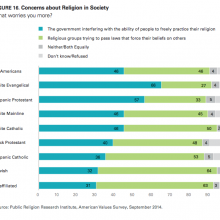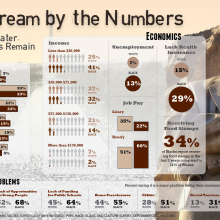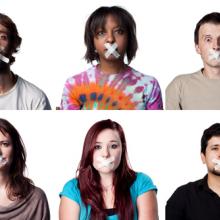PRRI
Most Americans say they feel a deep connection to the wider world.
But all that spiritual stargazing makes no difference in views about the facts of climate change and global warming, a new survey finds.
Just 5 percent of Americans thought climate change was the most important issue in the U.S. today. And religion was a major dividing point on how much — or how little — they think it’s a matter of concern, according to a new survey by the Public Religion Research Institute.
“We asked about spiritual measures such as being in awe of the universe, and you might think it would correlate with views about the universe. But, in fact, they have very little relationship,” said Robert Jones, CEO of PRRI, which conducted the survey on U.S. adults’ attitudes toward climate change, environmental policy and science.
When it comes to concerns over religious liberty, Americans are divided as to which is in more imminent danger: the ability to practice one’s religion without government inference, or the consequences to freedom of others enforcing their own religious beliefs on others. According to the 2014 American Values Survey, released Tuesday from the Public Religion Research Institute, nearly half of Americans (46 percent) say they are more concerned about religious groups trying to pass laws that force their beliefs on others. An equal number (46) say they are more concerned about the government interfering with the ability of people to freely practice their religion.
“I know what you did last Sunday,” claims the title of a new survey.
That’s according to a new survey by the Public Religion Research Institute released Saturday. The study, to be presented at the national meeting of the American Association for Public Opinion Research, was designed to measure the “social desirability bias in self-reported religious behavior.”
The survey finds that many Christians — and unbelievers, too — will exaggerate about attending worship in live phone interviews. However, when asked in an anonymous online questionnaire, people will answer more realistically.
Libertarians do not consider themselves a part of the Tea Party movement, a new study on public religion found.
The study, “In Search of Libertarians in America,” is the 2013 installment of the annual American Values Survey gathered by the nonpartisan Public Religion Research Institute and was released last Tuesday.
“Libertarians are significantly more likely to be non-Hispanic white, male, and young,” according to the report. Of the seven percent of all Americans who are libertarians by PRRI’s definition, 94 percent are non-Hispanic whites, 68 percent are male, and 62 percent are under the age of 50.
When it comes to religious affiliation, libertarians tended to be either white mainline Protestants (27 percent) or religiously unaffiliated (27 percent). No libertarians identified as black Protestant and only 11 percent identified as Catholic.
Yesterday’s “Let Freedom Ring” ceremony in Washington, D.C., honored the nation's substantial advances in racial equality in the fifty years since Dr. Martin Luther King, Jr. delivered his now-iconic “I Have a Dream” speech.
But events this year — from the Supreme Court gutting the Voting Rights Act to the House eliminating funding for food stamps to the Trayvon Martin trial — are posing serious challenges to our national progress towards true equality for all.
An infographic from the Public Religion Research Institute, "The Dream by the Numbers," highlights systemic inequalities that still work against communities of color today. The statistics are grim: black communities are unemployed at nearly double the rate of white communities. Fewer than 20 percent of black youth will receive a college or graduate degree. Twice as many blacks lack health insurance as whites. And nearly 70 percent of blacks surveyed mentioned “lack of opportunities for young people” as a top concern for their community.
WASHINGTON — Half of Americans worry that religious freedom in the U.S. is at risk, and many say activist groups — particularly gays and lesbians — are trying to remove “traditional Christian values” from the public square.
The findings of a poll published Wednesday reveal a “double standard” among a significant portion of evangelicals on the question of religious liberty, said David Kinnaman, president of Barna Group, a California think tank that studies American religion and culture.
While these Christians are particularly concerned that religious freedoms are being eroded in this country, “they also want Judeo-Christians to dominate the culture,” said Kinnamon.
“They cannot have it both ways,” he said. “This does not mean putting Judeo-Christian values aside, but it will require a renegotiation of those values in the public square as America increasingly becomes a multi-faith nation.”
On Tuesday, the religion, policy, and politics project at Brookings and the Public Religion Research Institute (PRRI) hosted a forum to release PRRI's fourth American Values Survey (AVS), a large national, multi-issue survey on religion, values, and public policy.
We sent some of our interns to listen in on the findings. Here's what they thought about some of the issues raised by the report.
More American Catholics believe their religious leaders should be focused on issues related to poverty and social justice during this election season, rather than spending time and energy on other issues such as abortion, according to a new survey released this week by the Public Religion Research Institute.
The results of the 2012 American Values Survey demonstrate that American Catcholics -- and the "Catholic vote" -- is far from the monolith some politicians might like to believe they are.
"The survey confirms that there is no such thing as the 'Catholic vote,'" Robert P. Jones, CEO of PPRI and co-author of the report, told Reuters. "There are a number of critical divisions among Catholics, including an important divide between 'social justice' and "right to life' Catholics."
For instance, on the question of the public engagement of the church, the 2012 American Values Survey found important divisions between Catholics who prefer a “social justice” emphasis that focuses on helping the poor and Catholics who prefer a “right to life” emphasis that focuses on issues such as abortion.
Young millennials — age 18 to 25 — are more comfortable with an evangelical than Mormon (or atheist or Muslim) president. This, according to part two of the Millennial Values Survey put out by the Public Religion Research Institute and Georgetown University’s Berkley Center.
Nearly six in 10 of those surveyed say they would be comfortable with an evangelical Christian serving as president, while 44 percent would be comfortable with a Mormon.
The numbers line up with those supporting President Barack Obama over Gov. Mitt Romeny at 55 percent to 39 percent — a spread that has actually increased 16 points since March.
But that won’t necessarily convert into votes. Nearly two-thirds of those surveyed are registered to vote, but only half report they are absolutely certain they will cast a vote in November.
The candidates’ religion isn’t the only factor affecting young peoples’ voting patterns. Another issue is a lack of voter engagement in the political process altogether.
“Millennials have a reputation for being the ‘wired’ generation, but when it comes to government, they’re unplugged,” said Daniel Cox, PRRI research director, in the news release Friday. “Across a range of measures, younger millennials indicated that they are disillusioned with the government’s ability to respond to their needs.”
College-aged adults are not letting their moral beliefs on social issues filter into their politics.
According to the just released “Millennial Values Survey” by the Public Religion Research Institute and Berkley Center for Religion, Peace and World Affairs at Georgetown University, adults age 18-24 are much less likely than their parents to cite social issues like abortion (22 percent) or same-sex marriage (22 percent) as critical.
While the group is split on social issues personally, it doesn’t factor into its political reality. For example, while 51 percent believe abortion is morally wrong, 59 percent believe access to abortion should be legal. Likewise, 48 percent believe sex between members of the same gender is morally wrong, but 59 percent favor allowing same-sex couples to legally marry.
The gap is also evident in their religious affiliation. The percent of religiously unaffiliated jumped from 11 percent in childhood to 25 percent now.
Their attitudes toward Christianity paint a picture of possible motives behind the shift. Two-thirds say that Christianity can be described as “anti-gay,” and 62 percent believe present-day Christianity is “judgmental.”
The full survey will be released this morning at Georgetown University. Check back with Sojourners for more coverage of the findings.
Sandi Villarreal is Associate Web Editor for Sojourners. Follow Sandi on Twitter @Sandi.








